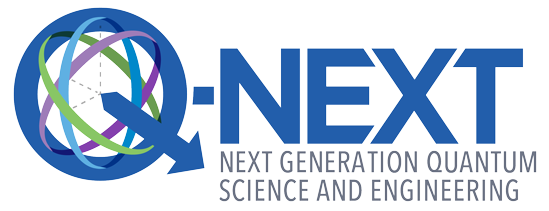In the News
-
Who cares about quantum?
From Direct Current: "Quantum" is everywhere these days — in the news, on TV, in the titles of blockbuster action films — but what even is it? Why is it important to understand it? Who cares about quantum? The Department of Energy gets philosophical with David Awschalom about scientists' brain-bending research, the massive impacts it could have on our lives, and the joy and frustration of chasing breakthroughs that can take decades to arrive. Read More
-
Women in STEM: in conversation with Assistant Professor Jennifer Choy
From AZoQuantum: AZoQuantum spoke with Q-NEXT collaborator Jennifer Choy, an assistant professor at the University of Wisconsin-Madison, about the field of quantum physics and her impressive research career in this sector. Read More
-
Researchers take a step toward novel quantum simulators
From SLAC News: Researchers at Stanford University and SLAC National Accelerator Laboratory, including Q-NEXT's David Goldhaber-Gordon, take a step toward novel quantum simulator that could help answer questions about certain kinds of superconductors and other unusual states of matter. Read More
-
Quantum information science and engineering opportunities for undergraduate students: My experience as an OQI fellow
From Medium: Open Quantum Initiative undergraduate fellow Ariadna Fernandez writes about her summer experience at the University of Chicago, where she used both a classical-quantum algorithm and a quantum computer simulator to calculate molecular system energies. Read More
-
Quantum computers could solve countless problems — and create a lot of new ones
From Time: Q-NEXT collaborator of Jay Lowell is quoted in this Time cover story on the frontier that is quantum computing. Read More
-
Quantum Computing Cybersecurity bill signed into law
From FEDweek: President Biden has signed into law HR-7535, the Quantum Computing Cybersecurity Preparedness Act, to move federal agencies toward encryption for their IT systems strong enough to resist attacks from quantum computers developed in the future. Read More
-
New algorithm closes quantum supremacy window
From Quanta Magazine: Q-NEXT collaborator Bill Fefferman is quoted in this piece on a new result related to random circuit sampling. The popular technique for showing the power of quantum computers doesn’t appear scale up if errors go unchecked. Read More
-
The National Quantum Initiative Supplement to the President’s FY 2023 budget released
The third annual report on the National Quantum Initiative program, as required by the NQI Act, is available. Read More
-
Quantum leaders discuss past, present, future of quantum technology at Chicago Quantum Summit
From the Chicago Quantum Exchange: The fifth annual Chicago Quantum Summit, held Nov. 14 – 15, 2022, brought together over 220 members of the quantum information science and technology community from across the nation and around the world. Industry leaders, US government officials, university presidents, and national laboratory directors gathered to discuss quantum education, cutting-edge quantum research, and what comes next for the rapidly growing field. Read More
-
Intel quantum wisdom: Think quantum is powerful? You’re right. Think it will happen soon. You’re mistaken!
From HPCwire: Intel's James Clarke, a member of Q-NEXT, talks about the company's quantum strategy, goals and achievements. Read More
News and features
See all news and features-
Design rules and synthesis of quantum memory candidates
From the University of Illinois Urbana-Champaign: Researchers use density functional theory calculations to identify possible europium compounds to serve as a new quantum memory platform. They also synthesize one of the predicted compounds, a brand new, air-stable material that is a strong candidate for use… Read More
-
‘Ruler for light’ could enable detailed measurement in personal devices
Frequency combs have revolutionized precision measurement, but the bulky, power-hungry devices are limited to lab settings. A new efficient laser “microcomb” developed by Stanford researchers could bring that revolution to the handheld electronics realm. Read More
-
Resurrecting niobium for quantum science
For years, niobium was considered an underperformer when it came to superconducting qubits. Now scientists supported by Q-NEXT have found a way to engineer a high-performing niobium-based qubit and so take advantage of niobium’s superior qualities. Read More
-
Researchers from startups, government labs and academia develop new techniques for making qubits out of erbium
Argonne project addresses quantum technology challenges and highlight sthe versatility of a rare-earth metal used in lasers and to color glass. Read More
-
Meet Edward Schmitt, facilities engineer
Former Marine Corps electronics technician Edward Schmitt keeps the Argonne Quantum Foundry running while advocating for veterans. Read More
